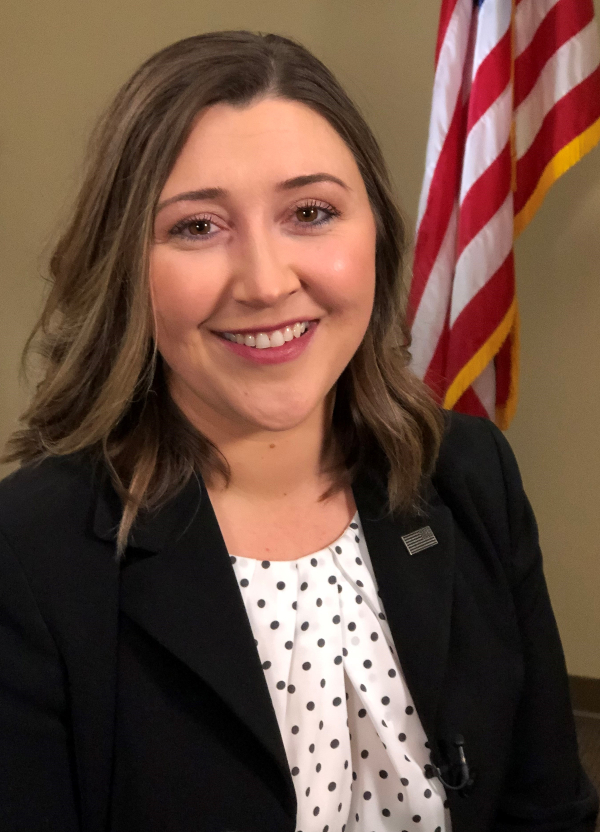Army Medic Persists in Finding New Career and New Path Home

Joyce Simon had her ducks in a row. The Army medic carefully planned her transition out of the military more than a year ahead. She attended meetings for the Army’s transition program, networked with employers, and signed up for a corporate fellowship to gain additional experience in the civilian world.
Then COVID-19 hit.
Her fellowship was canceled, networking opportunities were postponed or went virtual, and her carefully planned transition felt uncertain.
But she persisted and stayed connected with beneficial resources.
With a little help from Wounded Warrior Project® (WWP), Joyce greeted 2021 with a new job at the Defense Health Agency (DHA) Immunization Healthcare Division in Fort Bragg, North Carolina. That’s home to her, so she’s relieved to be near family and close to support for her school-age son.
“After the fellowship opportunity got canceled, I went from Plan A to B to C,” Joyce said. She stayed in touch with her WWP Warriors to Work® specialist, Chanel Diaz-Woodall. “Chanel was instrumental in building my confidence to pursue my new job.”
Working with Chanel, Joyce polished her resume, practiced interview techniques, connected to classes and online seminars, and revisited VA benefits that are often overlooked for female veterans in the Army-required Soldier for Life Transition Assistance Program (SFL-TAP).
“Chanel continued to support me throughout the pandemic to not be discouraged when doors closed and I hit roadblocks,” Joyce said.
A New Chapter Built on a Legacy
Joyce muscled through 2020 with the determination of a third-generation soldier. Her grandfather and her dad also served in the Army. After basic training in Fort Jackson, South Carolina, Joyce went to Fort Sam Houston in San Antonio to become a medic and then to airborne school in Fort Benning, Georgia.
While on active duty, she studied health care administration and management. She served 10 years of active duty as a combat medic, including five years in Alaska. In addition to working as a medic, she was an instructor on resiliency subjects in the Basic Leadership Non-Commissioned Officer (NCO) Academy.
But even a resilient person faces a giant leap of faith upon leaving the security of a military job for the uncertainty of the civilian world.
“I loved the Army. It set structure in my life and helped me get to where I am now,” Joyce said. “One of the biggest concerns I had during my transition was the fact that I’d had this job for the last decade. I was really nervous about starting a new chapter in my life.”
Joyce wanted to focus on finding a job that met her and her son’s financial needs but also would be fulfilling.
In her WWP career counselor, Chanel, Joyce found a fellow soldier — someone who had been in her boots and knew what it felt like to leave the Army for the civilian world.
“It was extremely beneficial that she had gone through the process herself,” Joyce said. “She had a lot of firsthand knowledge of who I needed to talk to and what steps I should take first. She really helped me set a good foundation for my transition.”
Chanel was in her mid-20s when injuries forced her to trade her Army boots for dress shoes — while her husband was on active duty and she raised two young children. She registered as a wounded warrior with WWP before she took on the role of WWP career counselor. “I’m thankful that I started as the wounded veteran who was carried, and now I’m able to carry other warriors on their journeys,” Chanel said.
Opening a Path for Women Veterans
Today, the future looks bright for Joyce in her new job as a management analyst with the DHA’s South Atlantic Region.
“Women struggle in the military to earn their place among the ranks,” Joyce said. “When we transition out, it becomes a new struggle to turn off that mindset. We are constantly overlooked when it comes to the term ‘veteran’ as a status. The training sessions Chanel recommended were filled with mentorship from successful businesswomen who volunteered to share stories that uplifted and empowered us.”
WWP’s career counseling program includes events that provide resources to female veterans who are transitioning out of the military and female family members of veterans. The events cover business etiquette and some of the struggles that can make a transition harder for women: sexual harassment, sexism, motherhood, work-life balance, and other issues.
“Chanel and Wounded Warrior Project were pivotal in my transition,” Joyce said. “I don’t think I would be where I am without meeting her. She’s been influential and has made a great impact on how I pursued my dream job.”
Although a 2020 WWP survey of the wounded warriors it serves found that 41% experienced employment challenges due to the pandemic, there is reason for optimism. WWP helped place nearly 2,000 wounded veterans and family members in new careers in 2020, with combined first-year salaries totaling nearly $94 million. Learn more about WWP career counseling.
About Wounded Warrior Project
Since 2003, Wounded Warrior Project® (WWP) has been meeting the growing needs of warriors, their families, and caregivers — helping them achieve their highest ambition.